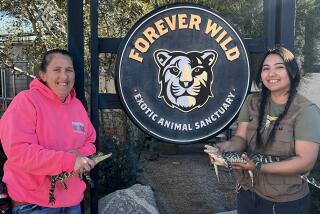Farmer seeking someone bullish on alligators : $1.5 million will buy his tourist attraction, including 2,000 linear feet of the snaggletoothed reptiles.
- Share via
HOMESTEAD, Fla. — There is a sign pointing the way to John Hudson’s 40-acre farm, but it’s hand-painted and nailed cockeyed to a pole and partially hidden by tall weeds on a two-lane road so far back into Everglades country that you have to look for it. The sign reads “Airboat Rides and Gators--Straight Ahead.”
We’re not talking Disney World here. We’re talking a piece of high ground in the swamp, littered with derelict trucks and rusted camper bodies, and populated by more than 4,000 of the most fearsome and fascinating creatures on Earth. But on an average day, some 150 people, many from Europe, find their way out here to take a look.
One recent morning Hudson broke away from a group of German tourists and leaned over a low cinder-block wall to look into pens where several hundred young two and three-foot-long alligators lay in the sunshine. With snaggletoothed overbites and a slight upturn to their jawline, the animals seemed to be smiling in warm contentment.
“Yep,” said Hudson, a bearded 68-year-old with a resonant baritone that once served him well as a Southern Baptist preacher, “gators have been good to me.”
At the sound of Hudson’s voice, the gators stampeded to the far end of the enclosure and scrambled into a wriggling pile. “They recognize my voice and they associate it with trouble,” Hudson said with a laugh. “They think I might be coming in to get them.”
That day the gators had nothing to fear. In fact, the next time Hudson lassos one of his alligators it might be to load it up for a truck ride to Mississippi, where South Florida’s only gator farmer intends to set up a larger commercial operation. There, he said, he will produce 25,000 pounds of gator meat a year by 1992. What Hudson has in mind is gator burgers, gator nuggets and barbecue gator, available in supermarkets everywhere.
“Who eats gator meat?” he asks. “Anybody who’s ever tried it. Low fat, low cholesterol and high in protein.”
In preparation for that day, Hudson’s ramshackle, low-tech tourist attraction is for sale. The asking price is $1.5 million. For that the buyer will get a house, a big tin-roof shed, six airboats, several junked vehicles and 2,000 linear feet of live alligator, in whatever configuration desired.
“You could have 200 10-footers, 1,000 two-footers or any combination you want,” Hudson said. “But I suggest the buyer take at least a couple of the 15-footers out in the ponds there, because those are the ones people like to see.”
Hudson claims his tourist business takes in an average of $1,000 a day. Admission to the farm is $1, airboat rides through the saw grass are $7.50, and when someone is there to open the snack bar, it’s $3 for a gator burger on a bun.
“A real entrepreneur could quadruple business here overnight,” said Hudson, whose small staff is composed of recovering alcoholics referred by a rescue mission.
Hudson is a junior high school dropout, former casino owner and one-time hellfire preacher from Alabama who bought an airboat ride business here, some 25 miles south of Miami, 13 years ago. In 1985, when the federal government removed alligators from the endangered species list, Hudson was one of the first in Florida to obtain a permit to raise them commercially.
As the price of gator meat and hide climbed (hide now sells for about $75 a foot), Hudson spotted the potential in other locations. This year he became the first of seven commercial operators to be licensed in Mississippi, according to biologist Jim Lipe of the state’s Department of Wildlife, Fisheries and Parks.
Hudson said he is packing up most of his gators and moving to the Gulf Coast town of Pascagoula, Miss., to be near his four children and 11 grandchildren and because in the colder winters, the reptiles will hibernate for up to four months, slashing his feed costs.
He thinks gator meat could become as popular in the South as catfish. Lipe, for one, doubts that. But Lipe has eaten gator meat, and describes it as “healthful and very good. I like it fried,” he said.
Hudson is bullish on gators, and not simply because of the economics of meat and leather. “There is a worldwide fascination with the reptile that dates to prehistoric times, and I think God gave this animal a special assignment,” he explained. “During times of drought, gator holes provide the only water to save many other species.
“In Mississippi, we’re going to use the proceeds of our operation to further our work with recovering alcoholics. So truly the alligator is an animal of salvation.”
More to Read
Sign up for Essential California
The most important California stories and recommendations in your inbox every morning.
You may occasionally receive promotional content from the Los Angeles Times.













